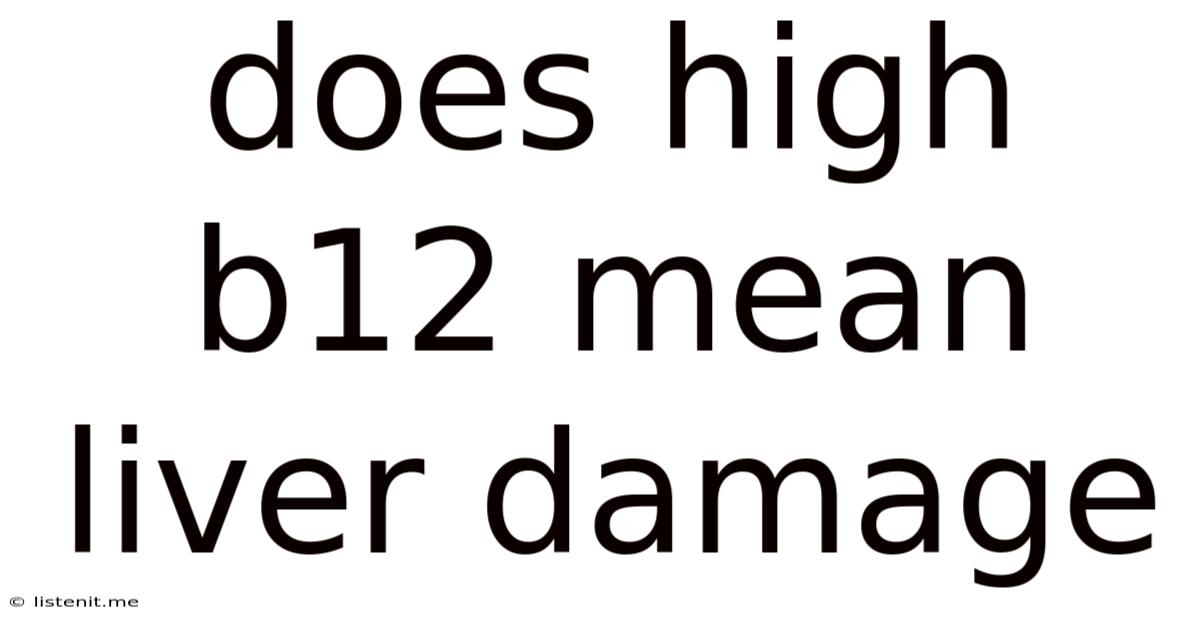Does High B12 Mean Liver Damage
listenit
Jun 12, 2025 · 4 min read

Table of Contents
Does High B12 Mean Liver Damage? Understanding Vitamin B12 and Liver Health
High levels of vitamin B12, also known as hypervitaminosis B12, are rarely seen. While a deficiency is far more common, understanding the potential implications of elevated B12 levels, particularly concerning liver health, is crucial. This article delves into the complex relationship between vitamin B12 and liver function, exploring whether high B12 definitively indicates liver damage and what other factors might contribute to elevated levels.
Vitamin B12: A Crucial Nutrient
Vitamin B12, or cobalamin, plays a vital role in numerous bodily functions, including:
- Red blood cell formation: B12 is essential for the production of red blood cells, preventing anemia.
- DNA synthesis: It's crucial for DNA replication and cell growth.
- Nerve function: B12 contributes to the maintenance of the myelin sheath protecting nerves, preventing neurological damage.
- Energy metabolism: It participates in energy production from food.
Understanding Liver Function
The liver is a multifaceted organ performing over 500 functions. Key roles relevant to B12 include:
- Nutrient metabolism: The liver processes and stores various nutrients, including B12.
- Waste removal: It filters toxins and waste products from the blood.
- Protein synthesis: The liver synthesizes vital proteins.
- Blood clotting: It produces clotting factors.
The Relationship Between B12 and the Liver: A Complex Picture
A direct causal link between high B12 levels and liver damage isn't definitively established. While the liver plays a role in B12 metabolism, elevated levels don't automatically signal liver dysfunction. Instead, several factors can contribute to both high B12 and liver issues, creating a complex interplay:
1. Impaired Liver Function Affecting B12 Metabolism:
A damaged liver might struggle to metabolize B12 effectively. This doesn't necessarily lead to high B12, but rather can lead to a build-up of other metabolites that might impact liver function further. This is a consequence of liver disease, not a cause.
2. B12 Supplements and Overdosing:
The most common reason for high B12 is excessive supplementation. Individuals taking high doses of B12 supplements, often without medical supervision, can experience elevated levels. While generally considered safe, excessively high levels can have potential side effects, though rarely severe liver damage.
3. Pernicious Anemia and Treatment:
Pernicious anemia, an autoimmune condition affecting B12 absorption, is often treated with high doses of intramuscular B12 injections. These injections can temporarily result in elevated B12 levels, but this is a managed and intended consequence of treatment, not an indicator of liver damage.
4. Certain Medical Conditions:
Some medical conditions can indirectly affect both B12 levels and liver health. For instance, conditions affecting nutrient absorption, such as Crohn's disease or celiac disease, could impact B12 levels while also potentially causing liver inflammation or damage.
5. Genetic Factors:
Genetic predispositions might influence both B12 metabolism and liver susceptibility to damage. These interactions are complex and require further research.
6. Alcohol Consumption:
Chronic alcohol abuse is a known cause of liver damage (cirrhosis, alcoholic hepatitis). While there's no direct link between alcohol and elevated B12, alcohol misuse can affect nutrient absorption and metabolism, potentially impacting both liver and B12 levels indirectly.
High B12: Symptoms and Concerns
While high B12 is usually asymptomatic, some individuals may experience:
- Mild nausea
- Diarrhea
- Skin rashes
These symptoms are not specific to high B12 and could be indicative of various health problems. Severe side effects are rare.
Important Note: Elevated B12 levels, in themselves, are not a primary indicator of liver damage. It's crucial to consider the broader clinical picture and rule out other potential causes.
Diagnosing High B12 and Liver Issues
Diagnosing high B12 typically involves blood tests measuring vitamin B12 levels. Diagnosing liver problems may involve a range of tests, including:
- Liver function tests (LFTs): These blood tests assess liver enzyme levels, indicating liver damage or inflammation.
- Imaging tests (ultrasound, CT scan): These visualize the liver, detecting abnormalities such as scarring or tumors.
- Liver biopsy: A small tissue sample is taken from the liver for microscopic examination.
When to Seek Medical Attention
Consult a healthcare professional if you experience:
- Symptoms suggestive of liver disease: Jaundice (yellowing of skin and eyes), abdominal pain, swelling, fatigue, dark urine, light-colored stools.
- Unexplained high B12 levels: Your doctor will investigate the cause, ruling out potential underlying conditions and adjusting B12 supplementation if necessary.
Conclusion: High B12 and Liver Health – A nuanced perspective
High B12 levels do not directly indicate liver damage. While the liver plays a part in B12 metabolism, an elevated level is more likely a consequence of excessive supplementation, certain medical conditions, or treatment for conditions like pernicious anemia. Liver damage, on the other hand, has multiple causes unrelated to B12. If you have concerns about your B12 levels or liver health, consult a doctor for a comprehensive evaluation. They can conduct the necessary tests, consider your individual medical history, and determine the appropriate course of action. Don't self-diagnose or self-treat. A professional medical opinion is crucial for accurate diagnosis and effective management of both high B12 and potential liver issues. Remember, focusing on a balanced diet, regular exercise, and responsible supplement use are key aspects of overall health and wellness.
Latest Posts
Latest Posts
-
Normal Heart Rate For Asthma Patient
Jun 13, 2025
-
During Independent Homologous Chromosomes Segregate In A Random Manner
Jun 13, 2025
-
Red Yeast Rice And Fish Oil
Jun 13, 2025
-
How Does A Dc Dc Converter Work
Jun 13, 2025
-
Amount Of Air That Can Be Forcibly Exhaled
Jun 13, 2025
Related Post
Thank you for visiting our website which covers about Does High B12 Mean Liver Damage . We hope the information provided has been useful to you. Feel free to contact us if you have any questions or need further assistance. See you next time and don't miss to bookmark.